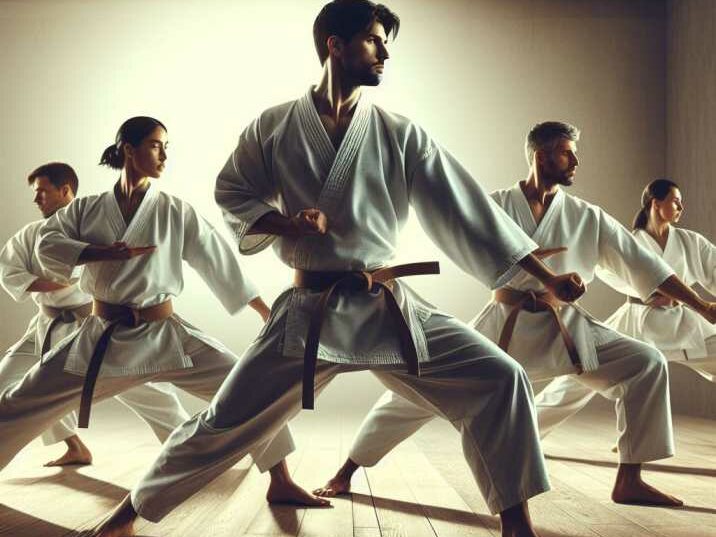Introduction:
Table of Contents
Karate, a martial art renowned for its striking techniques and disciplined approach, has captivated practitioners and enthusiasts worldwide. Yet, beyond its physical prowess lies a profound philosophy that shapes its practitioners’ mindset and way of life. In this article, we embark on a journey to uncover the philosophy behind Karate, exploring its origins, core principles, and enduring significance.

The Philosophy Behind Karate:
Karate, originating from the Ryukyu Kingdom (modern-day Okinawa, Japan), is deeply rooted in the philosophies of Zen Buddhism, Confucianism, and Taoism. At its core, Karate emphasizes self-discipline, respect, and humility. The term “Karate” itself translates to “empty hand,” symbolizing the practitioner’s unarmed combat skills and the absence of weapons.
Understanding the Principles:
Karate
is guided by fundamental principles that extend beyond physical techniques. These include:
- Kata: Forming the cornerstone of Karate, kata are choreographed sequences of movements that encapsulate various techniques, stances, and philosophies. Each kata embodies a specific theme or principle, serving as a repository of knowledge passed down through generations.
- Kihon: Kihon encompasses basic techniques such as punches, kicks, and blocks. Practitioners devote considerable time to mastering these fundamentals, as they form the building blocks of advanced techniques and combinations.
- Kumite: Kumite, or sparring, fosters the application of techniques in a dynamic, live setting. Beyond physical combat, kumite cultivates mental fortitude, adaptability, and sportsmanship.

The Code of Bushido:
Karate is deeply influenced by the Bushido code, the way of the warrior prevalent in feudal Japan. This code emphasizes values such as integrity, loyalty, and honor, aligning closely with the principles upheld in Karate.
Relevance in Modern Times:
While Karate’s origins trace back centuries, its philosophy remains relevant in contemporary society. In an era marked by rapid change and uncertainty, Karate instills values of resilience, self-reliance, and perseverance. Moreover, its emphasis on self-defense and personal development resonates with individuals seeking physical fitness and mental well-being.
Table of Information:
| Principles | Description |
|---|---|
| Kata | Choreographed sequences embodying Karate techniques |
| Kihon | Basic techniques forming the foundation of Karate |
| Kumite | Dynamic sparring exercises for practical application |
Conclusion:
In conclusion, What is the philosophy behind Karate? Karate transcends mere physical combat, embodying a profound philosophy that shapes the character and mindset of its practitioners. By embracing principles of discipline, respect, and self-improvement, Karate offers not only a path to mastery in martial arts but also a framework for personal growth and enlightenment.
FAQs:
- What is the philosophy behind Karate? Karate is grounded in principles of self-discipline, respect, and humility, drawing inspiration from Zen Buddhism, Confucianism, and Taoism.
- What are the core principles of Karate? The core principles of Karate include kata (choreographed sequences), kihon (basic techniques), and kumite (sparring), all of which contribute to physical and mental development.
- How does Karate relate to the Bushido code? Karate shares similarities with the Bushido code, emphasizing values such as integrity, loyalty, and honor, which are integral to the martial art’s philosophy.
- Is Karate relevant in modern times? Yes, Karate remains relevant in modern times, offering not only self-defense skills but also promoting physical fitness, mental resilience, and personal development.
- Can anyone practice Karate? Yes, Karate is accessible to individuals of all ages and backgrounds, providing an inclusive environment for learning and growth.


